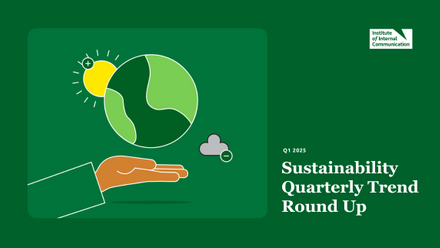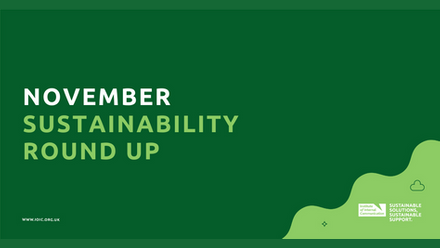As the climate emergency worsens, it’s increasingly apparent just how much responsibility organisations bear to dramatically reduce carbon emissions and their wider impact on the environment. Just 100 companies have been responsible for more than 70% of the world’s greenhouse gas emissions since 1988[i].
While the scale of the climate emergency might seem to currently outstrip human intervention, new laws are none the less underway to transform how organisations define and deliver stakeholder value.
EU legislation now requires a growing number of organisations to both report on ESG issues and Scope 1, 2 and 3 carbon emissions. This has huge consequences for all of us, not least in the field of internal communication.
When we first started thinking about sustainability here at the IoIC, our starting point was a shared concern over the escalating climate crisis and desire to take responsible action. You’ll know we’ve partnered with The Carbon Almanac project since summer 2022. You may also remember reading that the central IoIC team completed carbon literacy training late last year.
But as we’ve taken time to develop our understanding, we’ve also discovered that the function of internal communication is crucial for organisations to deliver sustainability and meet their Environmental and Social Governance obligations.
In one of two definitions, the Cambridge English dictionary describes sustainability as:
“the quality of being able to continue over a period of time: the long-term sustainability of the community”
ESG regulations demand that organisations report on how they’re managing non-financial risks relating to environmental and social criteria. They require organisations to expand their responsibilities to serve multiple stakeholders, rather than a singular preoccupation with shareholder returns. Organisations must now additionally demonstrate commitment to customers, employees, suppliers, governing bodies, and the wider community[ii].
For internal communicators, this is vitally important. The requirement for organisations to more seriously consider their impact on employees and co-workers places a spotlight on employee voice like never before.
To go further, it’s impossible for organisations to authentically deliver on ESG obligations without prioritising the impact of their operating practices on employee welfare, equal access to opportunity and more.
This positions internal communication at the epicentre of organisational sustainability as colleagues must be able to freely and authentically voice their concerns.
As we mark Earth Day 2023, the IoIC is thrilled to announce its commitment to understanding the sustainability opportunity for the internal communication profession. This is no mean feat, but it’s clear sustainability is as much a social and societal issue as it is an environmental one.
At the heart of organisational ESG responsibilities lies a commitment to stakeholders, of which employees and co-workers form a primary constituent part. Employee voice matters now, like never before. And the IoIC is here to help members leverage this transformational moment.





